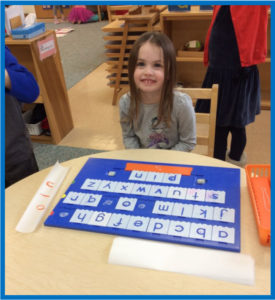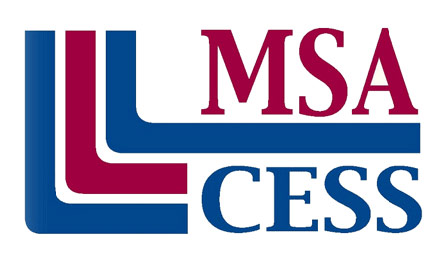
We all know the old adage “if at first you don’t succeed …………….” and believe it to be true for ourselves at least. We need to remember to apply it to our children also. It is easy to rescue young children and even older ones when things get tough. It is hard for us as parents to see our children struggle or be frustrated. Our first instinct is to step in and rescue. One of my favorite Dr. Montessori quotes is “Never help a child with a task at which he feels he can succeed.”
With this in mind, I would like to share an observation with you. One of the joys of my position is visiting the classrooms and watching our students “at work” every day. On a recent visit to an Early Childhood classroom, I observed a 4-year-old boy help a 3-year-old boy fold a large math rug. Seems like a simple enough task I know, however, this rug had to be folded in such a way that the strings appeared on the outside of the fold in order for the mat to be tied properly and stored.
The helping boy was amazing to watch. He gave verbal directions to the younger child to hold a corner in each hand and meet him in the middle to join corner to corner. This took a few attempts. Part of the problem was the younger boy’s arms were not long enough to hold the corners and stretch out the mat. So the older boy tried to do 3 corners himself. When that failed, he called on a passing child to help with that part. The collaborative effort did get the mat folded and all was well until the helper boy noticed the string needed to tie the mat was inside the fold.
Now, I said to myself, what is he going to do now? Will he throw up his arms and walk away? Will he tell the younger child to do it himself? After all he was just the helper. He scratched his head, said a few words to himself and proceeded to unfold the mat and start all over again. The younger child was still there waiting for the older boy to figure it out. This took some time, the boy did not get upset, stamp his feet, or ask for adult help. Neither of the children showed impatience or frustration. The younger boy assumed the older boy could do it and the older boy was not giving up. What a wonderful example of resilience. Nobody rescued these children, nor did they look to be rescued; the older boy took ownership of the task, he looked to himself to figure it out. I can only imagine the challenges he will rise to in the years to come. I do know that his tenacity will take him to great places.
If you ever read Raising Resilient Children by Drs. Brooks and Goldstein, you will see that among the guideposts they quote to foster resilience in children, are:
- Teaching children to solve problems and make decisions
- Helping children recognize that mistakes are experiences from which to learn
- Changing negative scripts
- Helping children experience success by identifying and reinforcing their “islands of competence”
There are others listed in the book, and more words of wisdom to help us help our children. What is important to note is Dr. Montessori’s visionary methodology of developing independence, self-esteem, self-discipline, responsibility and optimism in the face of challenge is all about raising resilient children.
In the coming weeks, we invite you to come and visit our Early Childhood and Kindergarten classes and see resilience in
the making.
Colette
Reference: Raising Resilient Children: Robert Brooks, Ph.D., and Sam Goldstein, Ph. D.



